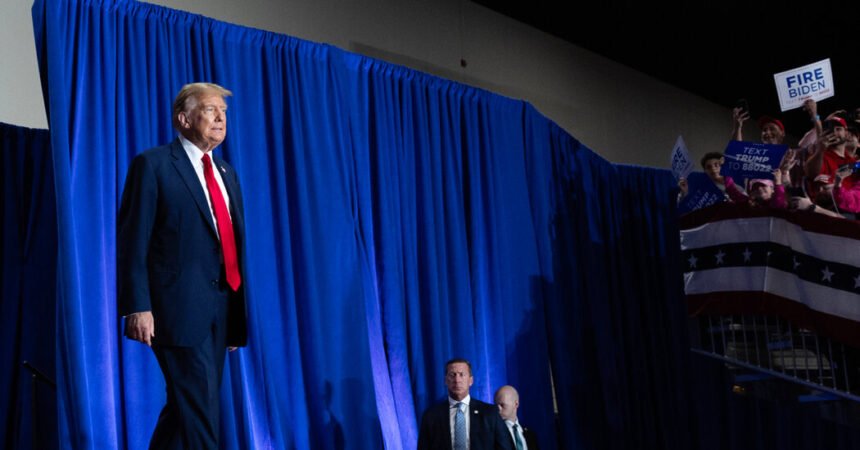Former President Donald J. Trump’s social media company soared in its first day of trading on the Nasdaq on Tuesday, giving the company an estimated market value of more than $8 billion, larger than established corporations like Mattel, Alaska Airlines and Western Union.
The biggest beneficiary of the market action has been Mr. Trump, who owns about 60 percent of Trump Media, making him the largest shareholder. His stake in the company — the parent of Truth Social, the online platform that is Mr. Trump’s main megaphone for reaching supporters and attacking critics — is worth about $5 billion on paper.
For many investors, investing is as much as a sign of support for Mr. Trump personally as it is for his relatively small, loss-making social media company, which describes itself as a platform that stands against censorship by Big Tech. Such was the frenzy on Tuesday that trading in Trump Media’s shares was briefly halted by the stock exchange shortly after it opened because of extreme volatility.
Trump Media closed its merger with Digital World Acquisition Corporation, a cash-rich public shell company, on Monday.
“We do appreciate President Trump but it’s more about free speech,” said Mark Willis, 63, who lives in Indian Trial, N.C. and has been buying shares in the public shell company that merged with Trump Media ever since the merger plan was proposed in 2021. “We believe this is the only social media platform that is not heavily influenced by the government.”
Scott Lewczak, a graphic designer in Nokesville, Va., and another longtime shareholder, said he is going to make money on the big surge in the price of Trump Media, but that is not the point. He said his investment was to support Truth Social and Mr. Trump.
“Even if I lose every penny, I will fight to the end,” Mr. Lewczak said.
The investors who have piled into the stock of Digital World, and now Trump Media, have tended to be individuals, rather than investment firms and hedge funds.
By most traditional measures, Trump Media’s valuation is inordinately high. The company took in just $3.3 million in revenue during the first nine months of last year, all from advertising on Truth Social, and recorded a loss of $49 million.
That means Trump Media’s market value is about 2,000 times its estimated annual revenue. Investors sometimes assign lofty valuations to small, loss-making companies in anticipation of rapid growth — or a belief that other investors will continue to bid up a company’s shares, for whatever reason — but typically not on this scale.
Other social media companies trade at far smaller price-to-sales ratios than Trump Media: Reddit is around 10, Meta is 7 and Snap is 6, according to FactSet. High-flying tech stocks like the chipmakers Nvidia and ARM trade at price-to-sales ratios of about 25.
On a message board on Truth Social, created by supporters of the merger, some of these investors cheered on the stock-market debut of Trump Media.
“If anyone deserves to be a trillionaire, it is Donald J Trump,” one poster said. “Never bet against a billionaire with over a hundred million supporters who are determined to fix America and preserve freedom for all” said another.
Chad Nedohin, 40, who has been a vocal supporter of the merger on Truth Social, said in an interview that most people buying Trump Media’s stock are not focused on the valuation of the company but making sure Truth Social remains viable.
“You are looking at people who are investors and not traders,” said Mr. Nedohin, who lives in Canada and works as an engineer and a Christian worship leader. “We are seeing long-term holders who are MAGA and they are Trump’s base.”
Still, based on its trading patterns, Trump Media looks a lot like the so-called meme stocks — GameStop, AMC Entertainment and others — that were propelled to dizzying heights by armies of amateur investors during the pandemic. Meme stocks tend to trade more on emotion than fundamentals.
“It’s difficult to say how this will trade, but it definitely has the DNA of a meme stock, so we might see some extreme volatility,” said Kristi Marvin, a former investment banker and editor of SPACInsider, which gathers data on the market for special purpose acquisition companies.
Trump Media’s prospects met with skepticism on popular investment boards on the social media platform Reddit. “Do people really dare to buy this stock?” asked one poster.
Many of the publicly listed holders of the stock, with most filings dating to the end of 2023, are retail investment advisers who help facilitate trading on behalf of individual clients, and those contacted by The New York Times were broadly unwilling to express a view on Trump Media themselves.
“Our typical advice to our clients is that you are best owning a diversified portfolio,” said Kevin Grogan, chief investment officer for Buckingham Wealth Partners.
Digital World was founded as a special purpose acquisition company. The sole purpose of a SPAC is to raise money from investors and then merge with an operating business, which then becomes the publicly traded entity.
Any big investors that bought shares of Digital World or Trump Media would not be required to publicly disclose their holdings until the middle of May. Some big investors have shorted, or bet against, Trump Media shares, on the assumption that the company cannot continue to trade at such a heady price.
Trump Media, according to S3 Partners, a financial data company, is now the most shorted company to merge with a SPAC in the United States.
The merger between Trump Media and Digital World this week was completed as Mr. Trump faced a deadline to secure a bond to cover a big penalty imposed by a judge in a civil fraud case. But in a break for Mr. Trump, an appellate court reduced the amount that he would need to post, to $175 million from $454 million, and gave him more time to raise the money.
The appellate court’s action seemed to ease the pressure on Mr. Trump to try to tap his newfound Trump Media wealth. To do so, he would need the company’s new seven-member board to remove a restriction that prevents him from selling shares or using shares as collateral for six months.
The board may still vote to loosen that restriction if that is what Mr. Trump wants. He holds tremendous sway over the company: Besides owning about 60 percent of Trump Media’s stock, he owns a separate class of shares that gives him at least 55 percent voting power over any measure presented for a shareholder vote. And the company’s seven-member board is stacked with loyalists, including
his eldest son, Donald Trump Jr..
But now that Mr. Trump no longer faces an urgent need to raise a large amount of cash, he might be content to let the six-month restriction on selling shares remain. From Mr. Trump’s perspective, the surging price of Trump Media’s shares gives him bragging rights on the campaign trail. One of his political calling cards has been to talk about his success as a businessman and his enormous wealth — something that’s easier for him to do since the merger.
The bigger challenge for Trump Media’s board is coming up with a strategy to increase the company’s business and expand the reach of Truth Social in order to justify the company’s valuation. Truth Social is a relative minnow in the social media universe and largely dependent on Mr. Trump’s posts for drawing traffic.
In merging with Digital World, Trump Media got a badly needed infusion of roughly $300 million in cash that Digital World had raised from investors. Without that infusion, Trump Media and Truth Social were looking at potentially shutting down.
And as a public company, Trump Media will be required to file periodic financial reports with the Securities and Exchange Commission and reveal in detail any deals it may strike with Mr. Trump.
“In a public company you have the scrutiny now of investors and regulators,” said Usha Rodrigues, a professor of corporate law at the University of Georgia School of Law. “Any stockholder now has standing to bring a lawsuit if they claim one of the company’s statements is misleading.”




